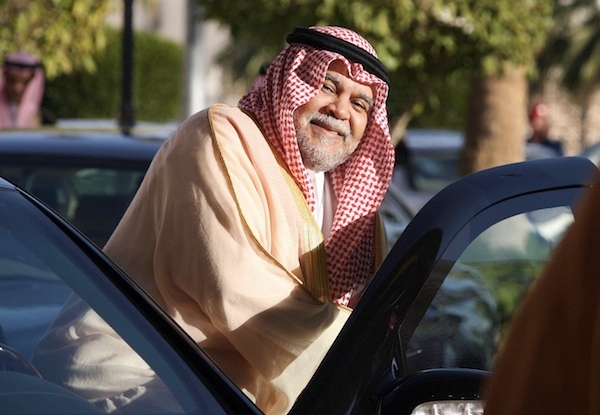Keep an eye on Saudi Arabia’s newly appointed spymaster, Prince Bandar bin Sultan. After a long stint in Washington where he served as ambassador for 22 years, the prince was recalled to Riyadh in 2005 and then largely sank from public view.
Reinstated to frontline politics last month, both King Abdullah and Barak Obama are investing their hopes in Prince Bandar to achieve mutual Saudi-American interests in response to ongoing unrest in the Middle East. Known for his flamboyant and maverick approach to politics, he has a unique opportunity to secure the vital interests of Saudi and its western allies.
Perhaps Saudi Arabia’s most skilled political operator, Bandar has a reputation for getting things done. He was once tasked with negotiating the controversial al-Yamamah arms deal with Thatcher’s government in 1985, which constitutes Britain’s largest ever export agreement worth £43 billion over the last twenty years. Bandar negotiated the contract over bibulous parties, according to the BBC, secured hundreds of millions of pounds worth of kickbacks for himself. In 2006, Tony Blair took the unprecedented step of blocking an investigation by the Serious Fraud Office into the issue, underscoring just how important the deal remains to British national interests.
Bandar also proved himself adept at bending policy in the kingdom’s favour while in Washington. During his appointment he oversaw difficult moments in US-Saudi relations, steering Bush père through the complications of the First Gulf War, and then negotiating the altogether trickier fallout from 9/11 with Bush fils. Indeed, his closeness to the Bush family earned him the nickname ‘Bandar Bush’.
It is no secret within the House of Saud that King Abdullah disapproves of Bandar’s profligacy. Parties at his sprawling West Virginia mansion on the Potomac, where decadence overrode diplomacy, are enshrined in Washington legend. His long bouts of depression and proclivity for more than the occasional drink have also raised eyebrows in some of Saudi’s political circles. When Bandar eventually returned to Saudi Arabia in 2005 he was appointed Secretary-General of the National Security Council but, in effect, had most of his powers curbed and was rarely seen in public.
But now Bandar is back. The House of Saud wants to insulate the kingdom against any adverse consequences from the Arab Spring. When protests spread to Egypt there was little they could do. But Saudi has not proved so passive in Bahrain where its armed forces have helped quash demonstrations. Before Abdullah committed his forces to Bahrain he first dispatched Bandar to several countries in the Far East, including Pakistan, India, and China, to explain Saudi policy.
True to form, Bandar’s trip was a triumph. He explained Saudi concerns about the growth of Iranian influence in the Persian Gulf. Like Iran, Bahrain is a predominantly Shia country although its ruling family is Sunni. If popular protests succeeded there, any incoming administration would likely favour Tehran and skew the regional balance of power.
This is the necessary context for understanding Bandar’s revival. Although Saudi’s big cities have remained largely stable, it is experiencing regular protests along its eastern coast (particularly in Qatif) where its oppressed Shia minority live. This is also where all of the country’s main oilfields are based.
Restoring calm in Saudi’s eastern province and in Bahrain will be among the first of Prince Bandar’s tasks. More importantly, he will now also oversee Saudi interests in Syria where the House of Saud is actively aiding rebels against Bashar al-Assad.
All of this chimes with American interests too. Washington has found itself overtaken by events in the region but wants stability in Bahrain because its Fifth Fleet is stationed there. The implications of any disruption to Saud Arabia’s oil reserves are obvious. And, in general terms, the White House is sympathetic to Saudi efforts in Syria and in its bid to curtail some of the more excessive elements of the Brotherhood’s agenda in Egypt.
It has offered to support the House of Saud in all this – but only on the condition that Bandar returned to coordinate joint US-Saudi interests in the new Middle East. The success of this nexus will determine the real winners of the Arab Spring.






Comments